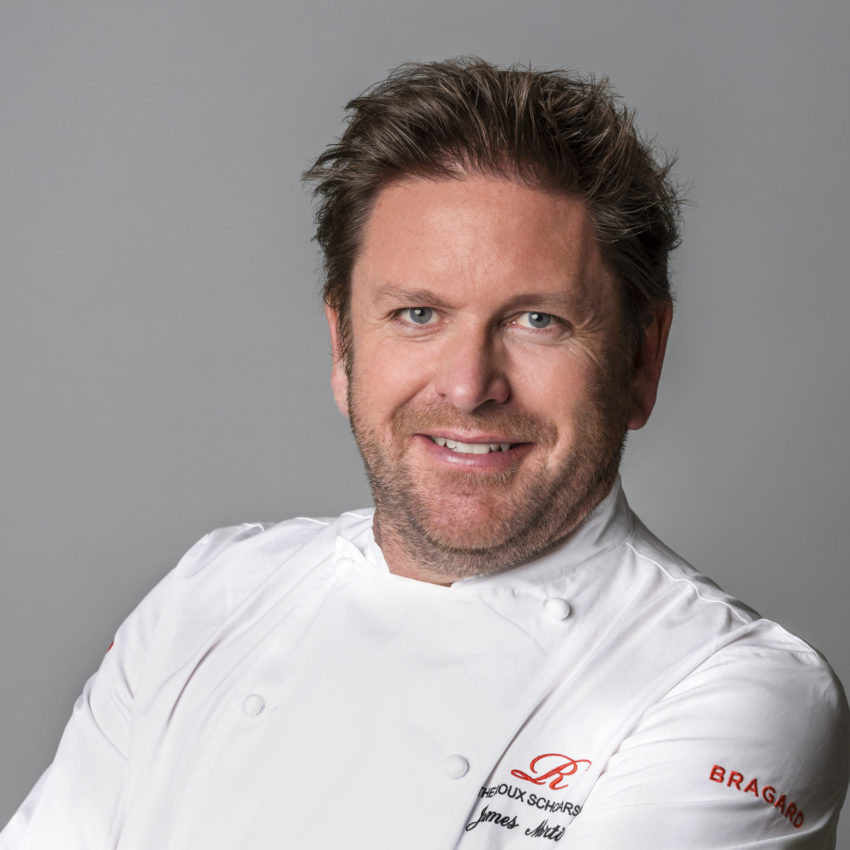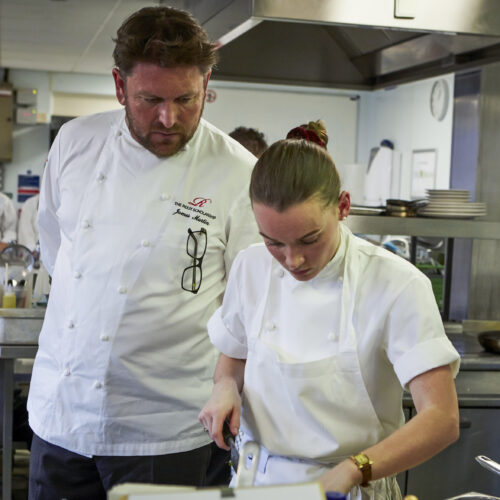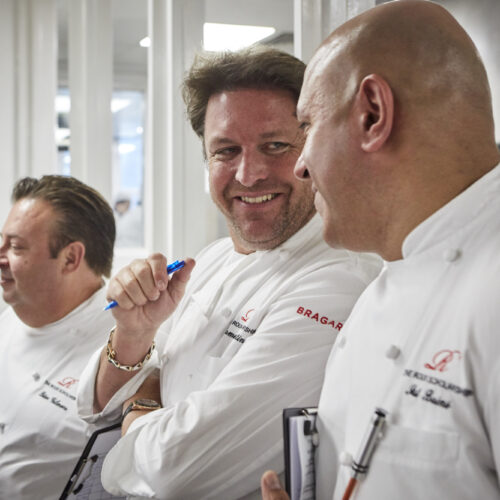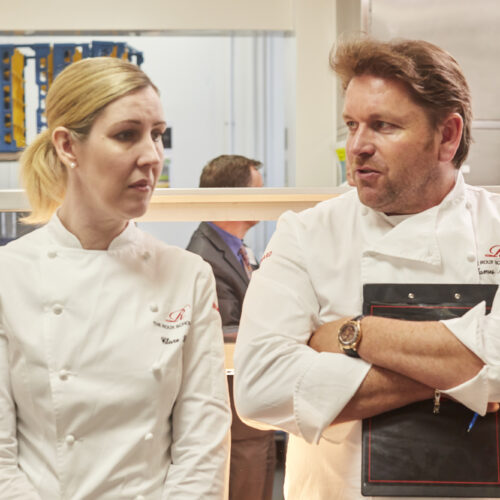Judge
James Martin
“A good cook cooks with confidence, and the skill and the flair will shine through. You’ve got to be a confident cook to fill in that form to enter the Roux Scholarship”

Chef and broadcaster James Martin has been a household name in Britain for more than 20 years. As host of his TV show Saturday with James Martin, and previously Saturday Kitchen as well as other shows such as James Martin’s Great British Adventure he is used to cooking under the gaze and scrutiny of millions of viewers. He is the chef at The Kitchen at Chewton Glen, and James Martin Manchester inside Manchester235 Casino.
James’s passion for food began at an early age when his father took the role of catering manager at the Castle Howard estate, a stately home in his native Yorkshire. Starting as a pot-washer at 12 years old, James then moved on minor tasks such as buttering bread and piping eclairs. Then at 13, a trip to the South of France with his father, who was importing St Emilion wines by HGV, gave him the opportunity to really experience good food and wine in some of the best wine chateaux in France, and from which moment he was hooked.
James did his formal catering training at Scarborough Technical College, during which time he was Student of the Year for three years running; he names his lecturer Ken Allanson as a key inspiration after he instilled in James the confidence and humility to succeed in the hospitality industry.
From there, he trained at Hostellerie De Plaisance, Saint-Émilion, France, and then at the three-star-Michelin star Maison Troisgros in Roanne, France. He then returned to London and joined the staff of Anthony Worrall Thompson's One Ninety Queen's Gate restaurant in Kensington pastry chef. His next moves saw him join the kitchen at Alastair Little in Soho, the two-star Michelin The Square in Mayfair, and another two-star Michelin star restaurant, Harvey's, in Wandsworth.
In 1993, he left London to spend two years as a pastry chef at Chewton Glen Hotel, in Hampshire, to which he would return later with his name over the door. Then, at the age of 21, James joined with Robin Hutson and the late Gérard Basset to open Hotel du Vin in Winchester, realising his dream to be a head chef eight years earlier than he expected to.
In 1996, James started his TV career with appearances on Sky One before moving on to Ready, Steady Cook and The Big Breakfast. From there, he didn’t look back; with countless TV series of his own, not to mention books and live appearances he has become a household name. He now fronts his own show Saturday Morning with James Martin, as well as appearances on This Morning and most recently he has been on the road for his four series James Martin’s Great British Adventure, James Martin’s French Adventure and James Martin’s American Adventure.
Using his renown, he champions British producers and chefs, as well as those in France and America. Using his extensive experience in busy restaurant kitchens, he has the rare skill of being able to make delicious, enticing dishes under the intense pressure of onlooking TV cameras, often in live broadcasts, while simultaneously interviewing guests and presenting the programme.
In 2013, he opened James Martin Manchester based in the Manchester235 casino at the Great Northern Warehouse. Providing modern British cuisine in industrial chic surroundings it was listed in The Sunday Times Top 100 UK Restaurants for 2015/16.
In 2017, James joined forces with The Kitchen Cookery School and restaurant Chewton Glen to offer a range of inspiring classes and seasonal menus in the restaurant, cooking there regularly. He also has a number of premium cafés, called James Martin Kitchen, set in Stansted Airport, inside Debenhams at intu Lakeside, Manchester Piccadilly train station and at Glasgow Airport.
James joined the competition as a judge in 2013, the Roux Scholarship’s 30th anniversary year, when the competition was filmed as a TV series and has remained on the panel ever since.



What are your earliest memories of cooking?
Growing up on Castle Howard estate was the first time I experienced life in the kitchen. I started off washing pots that was my first gig and then I went from washing pots looking into the kitchen and thinking ‘Hopefully one day I’ll get the chance in there’ , then at about 12 I started working in the kitchen buttering bread and piping eclairs. At 13, I went on a trip down through France. My dad was a HGV lorry driver as well as a farmer and he used to import most of the St Emilion wine into the UK so I used to be dropped off in places like Chateau Figeac, Cheval Blanc, Montbousquet, all the famous red wine houses, and I learned to cook with French families. I got dropped off for three or four weeks at a time and picked up on his way back. So I worked with the grandmothers of the old famous chateaux. I learned the art of proper French provincial cooking.
How has TV changed the careers of chefs in the UK?
The power of television, and the internet and social media, has given chefs a platform that they never had before; and it has brought the chef from the back of the house to the front of the house. The kitchen was always the place that nobody would venture into, and that’s when I was training, somewhere to cover over. Now it’s brought the chef out to the front. And that’s because of the characters that chefs are, where they’ve worked and what they’ve done, how they operate and it’s fascinating to people, I think. And the appetite for it has grown and grown and grown. When I started, there were only four channels, now it’s on all channels. It’s certainly changed the careers and the lives of chefs , it’s hand in hand to what they do as a business. Chefs have realised to run a business you have to run on a much more personal level with the customer and that requires PR and a huge marketing effort behind it. To get you out there and get you known.
You’re used to cooking under pressure, with the nation’s TV viewers watching, what tips do you have for those daunted by cooking under the gaze of the renowned chefs on the Roux Scholarship judging panel?
The key to it is having confidence. I think cooking on TV is similar to cooking in competitions. If you don’t know what you’re doing before you get there, you have a big problem. Difference is that 12 people are looking at you on a judging panel, 3.5 million people are looking at you on TV and will criticise you instantly. A good cook cooks with confidence and the skill and the flair will shine through. You’ve got to be a confident cook to fill in that form to enter the Roux Scholarship in the first place. And I think it goes to show from the previous winners, all of them have been confident in terms of their abilities and what they stand for, and they then use that as a platform to go on and be successful in their future. Confidence is different to cockiness, they’re two very different things. Confidence is an expression of ability, cockiness is generally covering up a lack of ability.
Who have been your culinary heroes?
Chefs look back at their careers and people who have helped them, so I had Ken Allanson at college who taught me the rights and the wrongs and the focus, Michel Roux was a huge, a massive inspiration in my life. Not only practically wise for my career, but for my life in general. I looked to him for advice on so many different things, be it launching a restaurant, new dishes, or just general life advice. Those people who are aspire you and then become your friends, and there are a few over the years, such as Pierre Koffman, Brian Turner, all the people I looked up to so much as a young kid training, as a young chef, now to be stood on the golf course next to them as they tee off is something you value. He said when I joined the judging panel that we were going to get a bit of criticism for this, but he said ‘I know of everyone who cooks on TV, nobody cooks like you’. That will always be in my head. On TV I always try and cook the food that people will enjoy, and it is a genuine passion I’ve always had. In this industry, there’s a huge respect for talent and that respect comes for people who are older than me and younger than me, I can’t cook like people such as Mark Birchall, we’re all different and we all have our particular skill. To see somebody like that explore and go further, and then have him on my TV show and give people a platform, it’s great.
What do you enjoy about judging the Roux Scholarship?
Everything about it. It is the ultimate competition of its type. You just look at the previous winners, right back to the beginning and what they’ve achieved and what that’s led to in terms of a culinary family tree, of people who have gone through their kitchens. It touches across all the catering industry and long may it continue, and it will continue. Michel Roux Snr was hugely passionate about it. And Alain and Michel Jr are carrying on that legacy and that will continue to grow. Michel left a huge void, but his legacy is one of the greatest life-changing competitions you can have as a young cook.
What advice would you give applicants?
Practice! Do your costings, this is not a competition where you can wing it, you’ll be found out straight away. Cook from the heart, that confidence, cooking within your ability, stretch don’t over-stretch but stretch yourself you need to push your boundaries. And learn the classics, remember the dessert! The Roux Brothers built their careers on patisserie, and you should know that pastry is going to be important. Certainly in the regionals. On the judging panel, I’ve seen people who have done the best dessert go through to the final.
How do employers/kitchen brigades benefit from entering their chefs?
You see the knock-on effect for the brigade, and it comes from good leadership. You give the younger generation this opportunity and it’s a knock-on effect. It’s good to push the whole team. As restaurateurs, you want people to succeed and move on, progress and do new things, you don’t want a static team all the time. And when they do move on, somebody else gets to fill their role and learn from it too. It pushes the whole team, and pushes the other chefs in the brigade to do their thing.
Why is it important to learn and master the classic cooking techniques?
If you learn the mastery of classic cooking you’re 50 per cent of the way to success. Sure, there are trends and food fashions, and they're invaluable, but that classic mentality will never go away. It’s been here since Carême in the 18th/19th century and there’s always been Master Chefs, people at the top of their game, such as Carême and Escoffier. Why would it ever disappear? Yes there are going to be chefs out there creating those new and modern trends, but in in 100 years time people will still be talking about Escoffier and Carême and all those sort of people.
What have YOU learned thanks to being a judge?
I’ve learned so much; you learn new techniques and new ideas and that’s an amazing thing in this industry, we’re learning from everyone else. You never stop learning, whether you’re a judge or a guest judge. Whether you’re 8 or 80, you only know a snippet of what goes on out there and to have all those chefs and all that talent in one room, it’s excites whether you’re a judge or a guest or a punter, that’s the whole thing about it. It’s an exciting time, and an exciting place to be a judge. It’s the best competitions in the world, if not THE best, to be a judge in that is an honour and a privilege but you’re learning so many things from other people.